UPDATE: Thursday, 3:00 p.m. – Heifer Nepal, working in collaboration with 35 local farmer cooperatives and local governments, has provided relief supplies to about 11,000 families, more than 58,500 people, in eight districts in Nepal following devastating flooding. The disaster is threatening to cause a serious food shortage in the South Asian nation. About 80 percent of the southern agricultural belt of Nepal was submerged in water, according to local news agencies. More than 21,500 families in Heifer’s project areas have been impacted by the disaster.
In Kachanapur, the Federation of Nepalese Chamber of Commerce and Industry opted to distribute its relief supplies through Heifer’s cooperatives due to the reliable and transparent process. The Sangini Social Entrepreneurs Women’s Cooperative distributed relief materials to flood-affected cooperative members immediately after the initial impact. The women’s cooperative distributed noodles, water and rice. Heifer mobilized at least 15 social entrepreneur women’s cooperatives in Rapti Sonari for distribution of relief packages.
“This kind of relief program mobilized through Cooperatives and governed by women is really exemplary and a novel practice. Cooperatives can be the driving force for development. Women-led cooperatives coming to the front during such an emergency situation shows that Heifer has really empowered and equipped them with good leadership skills. It has contributed a lot in socio-economic transformation of the community and helped them to rise again after this serious disaster.” – Pattu Tharu, former Parliamentarian
Women-led cooperatives coming to the front during such an emergency situation shows that Heifer has really empowered and equipped them with good leadership skills. It has contributed a lot in socio-economic transformation of the community and helped them to rise again after this serious disaster. Pattu Tharu, former Parliamentarian
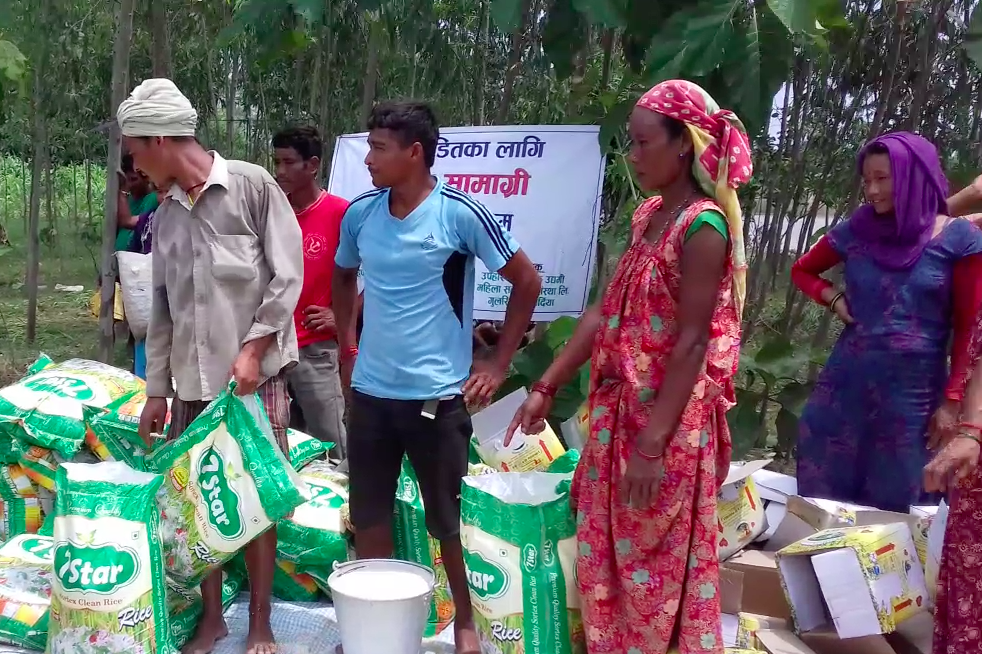
Distribution of relief supplies has included:
“I have noticed Heifer to be the only organization dispatching such a huge relief support to flood victims. Further, the dispatch mechanism is transparent and rational. Therefore, I am confident that all needy families of Rapti Sonari will receive relief packages from Heifer and SEW Cooperative. I would heartily like to thank Heifer family and its network for such great work during this emergency, " said Chakra Bahadur Adhikari, Chairman of Federation of Nepalese Chamber of Commerce and Industry in Kohalpur
As the flood water retreats, people have started to move back to their homes, but maintaining a livelihood is challenging for them with the damage to homes, livestock and crops.
Our Heifer farmers and staff are working hard in the wake of disaster, and there’s still a lot of work to do. You can help families rebuild by donating now.
---
UPDATE: Friday, 5:00 p.m. – Severe flooding is affecting more than 25,000 Heifer farming families in Nepal, India and Bangladesh. The floods are inundating farm fields, sweeping away thousands of livestock and displacing families in the South Asian nations.
The disaster is threatening to cause a serious food shortage in Nepal. About 80 percent of the the country's southern agricultural belt is submerged in water, according to local news agencies. The Heifer Nepal team reports that more than 25,000 farming families that Heifer works with in southern Nepal are suffering from the flash flooding, and that number could increase as contact is reestablished with communities that have been cut off by water.
You can help families rebuild by donating now.
Relief efforts are well underway in Nepal. Heifer Nepal, working in collaboration with local governments and Heifer cooperatives, is providing immediate assistance of food, water, medicine and animal feed to communities in need. According to local official Pattu Tharu, a former Parliamentarian, “This kind of relief program mobilized through Cooperatives and governed by women is really exemplary and a novel practice. Cooperatives can be the driving force for development. Women-led cooperatives coming to the front during such an emergency situation shows that Heifer has really empowered and equipped them with good leadership skills. It has contributed a lot in socio-economic transformation of the community and helped them to rise again after this serious disaster.”
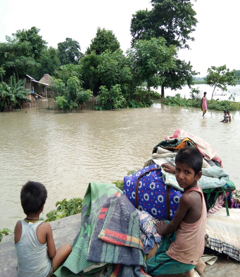
The Heifer Bangladesh team reports more than 3,000 farming families that Heifer works with are impacted by the severe flooding. This includes Heifer communities in Sirajgonj, Kishorgonj, Natore and Rajshahi districts. In Natore district, Heifer Bangladesh reports that a significant number of households are affected by flooding, crops are submerged in water and homestead vegetables and fodder fields are damaged. In Rajshahi district, agricultural plots have been affected by heavy rainfall. The most flood-impacted areas of Bangladesh are located to the north of Heifer communities. The government and Bangladesh Red Crescent Society are organizing immediate relief assistance in these areas. Heifer Bangladesh continues to assess conditions to assist Heifer communities.
The Heifer India team reports that 3,800 farming families that Heifer works with in 13 districts of Bihar have been heavily impacted by the flooding. In Purnea district, people are moving from villages to safer areas. Roads have been washed away, and agricultural lands are under water. In Darbhanga district, transportation and other community infrastructure are non-functional due to flooding, and agricultural lands are submerged. Heifer India is working with implementing partner, Mithila Gram Vikas Parisath, to assess damage and provide assistance to Heifer communities.
---
UPDATE: Tuesday, 1:00 p.m. – Severe flooding is devastating Nepal’s main food-producing region, inundating farm fields, sweeping away thousands of livestock and displacing families. The disaster is threatening to cause a serious food shortage in the South Asian nation. About 80 percent of the southern agricultural belt of Nepal is submerged in water, according to local news agencies.
The Heifer Nepal team reports that more than 15,000 farming families that Heifer works with in southern Nepal are suffering from the flash flooding, and that number could increase as contact is reestablished with communities that have been cut off by water.
You can help families rebuild by donating now.
“If you consider the casualties, the flooding can’t compare with Nepal’s earthquake disaster that killed nearly 9,000 people two years ago,” said Neena Joshi, a spokeswoman for the nonprofit Heifer International in Nepal. “But the flooding has affected a much larger area of land, with crops wiped out in so many places in the country’s most important food-producing region. The long-term effect of the flooding could be much bigger on agriculture and food security."
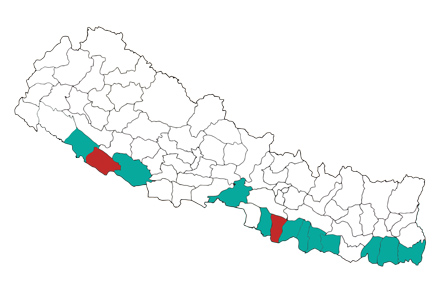
Heifer Nepal, working in collaboration with local governments and cooperatives, is providing immediate assistance of food, water, medicine and animal feed to communities in need.
“Reaching the flooded areas in the east has been extremely difficult, but our teams finally got there on Tuesday,” Joshi said. “In several areas in the east, the water is receding, and people are returning to their villages. Many of them are able to cook, so we’ll be working with the government to supply them with instant noodles, rice, lentils, cooking oil, biscuits, salt and sugar.”
“In the west, everything is still submerged, and we’re having great difficulty reaching communities. They’re unable to cook, so we’ll be supplying them with ready-to-eat food, such as biscuits and instant noodles.”
---
UPDATE: Monday, 6 p.m. — Heifer Nepal has mobilized teams to distribute relief supplies to families affected by severe flooding that has devastated the country’s main food-producing region.
Working in collaboration with the Nepalese government, Heifer Nepal is providing immediate assistance of food, water, medicine and animal feed to communities in need, said Sumnima Shrestha, communications and resource mobilization manager for Heifer Nepal.
You can help families rebuild by donating now.
The flooding is impacting Heifer communities in Banke, Dang, Bardiya, Bara, Rautahat, Dhanusha and Mahottari districts.In Banke, families have lost homes, livestock, sheds and crops. Assessments are in progress in other areas, and Shrestha said updates will be provided as conditions improve for travel.
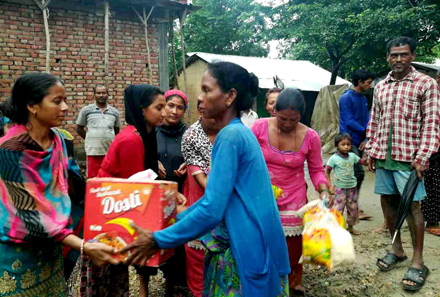
More than 15,000 Heifer farming families have been affected by the flooding. Many of the displaced families Heifer works with are staying in schools, tents or community buildings, Shrestha said.
Thousands of livestock were also swept away in the flood waters. The livestock losses coupled with the crop loss is threatening to cause a serious food shortage in the South Asian nation.
-----
KATHMANDU, Nepal – More than 15,000 Heifer farming families in Nepal are suffering from severe flooding that has also devastated the country's main food-producing region. Heavy rains have swamped farm fields, sweeping away thousands of livestock and displacing families. The disaster is threatening to cause a serious food shortage in the South Asian nation.
Sumnima Shrestha, communications and resource mobilization manager for Heifer Nepal, said three days of monsoon rains have inundated nine districts where Heifer works. Staff have not been able to reach some of the areas.
“We believe the number will rise as we reestablish contact with communities that have been cut off. Many have had to flee their homes, and they lack food and water,” Shrestha said. “The heavy rains hit at one of the worst times in southern Nepal, shortly after farmers planted their rice crop in the country’s most important agricultural region. The rice will likely be lost."
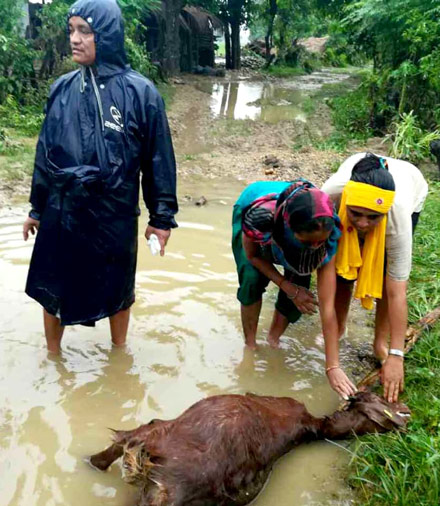
Shrestha said that thousands of livestock were also swept away in the raging waters.
"The loss of grain and animals could set Nepal up for a severe shortage of food,” she said.
Many of the displaced families Heifer works with are staying in schools, tents or community buildings. Roads are submerged and bridges are impassable, cutting off transport to the affected areas. Nearly 40 people have died in the flooding, including three members of one project family, Heifer confirmed Sunday. Our thoughts are with the families affected.
“Phone service to many of our project sites has been cut, leaving us unable to reach our field staff and partners,” Shrestha said. “We will likely receive more reports of severe damage as the communication lines reopen in the coming days.”
While Heifer Nepal staff is assessing damage and gathering relief supplies, some self-help groups have already mobilized to distribute what aid they could, Shrestha said.
The Sangini Social Entrepreneurs Women Cooperative have distributed noodles, water and beaten rice to the flood victims in Tikulipur, she said, but noted that need in other sites is critical.
